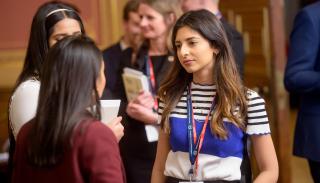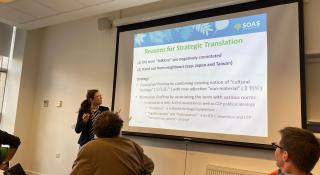
Breadcrumbs navigation
Networking in an age of social distancing
This article was written by
Peter Finn, Kingston University
This article was published on
To coincide with the release of a brief titled The PhD & the Powerful: A British International Studies Postgraduate Network Briefing Paper (and as an addendum to a document largely written before many of us had heard of social distancing), the brief’s author Peter Finn, a Senior Lecturer at Kingston University, provides some tips, garnered from a range of academics, about how to network in an age of social distancing.
- Develop your network: Given how quickly COVID-19 has changed many aspects of our lives, and in turn altered the allocation and use of some research funding and resources, your current network might not fit the direction you take moving forward. Inevitably, this means you will need to expand or develop your existing network. As such, do reach out to new contacts or those you have not been in regular contact with if appropriate.
- Ask people about their expertise: According to Professor of Publishing Alison Baverstock of Kingston University, who is also a publisher and director of the Kingston University Big Read, asking people to speak about their ‘ideas, or what shaped them, can be fruitful – and frankly welcome!’. In recent weeks Alison has made ‘quite a few appointments [...] on behalf of research students’, and has ‘been finding that’ giving people ‘the opportunity to consider a pre-lockdown, non-COVID-19 world, where they still had some independent agency, is proving really appealing.’ Expanding, Alison says that ‘if you have been trying to get an interview with someone significant, now might be a good time to try. Denied their usual routines, and excuses, you may be lucky.’
- Acknowledge current events: Caveating her prior advice, Alison says 'you never know [into] what circumstances your email of self-introduction is landing’. As such, adding ‘a sentence that acknowledges the changed world, before you say why you want to talk to them’ is important.
- Explore new possibilities: The academic community is responding to current restrictions in interesting and exciting ways. BISA, for example, has launched a series of online events. Events thus far have included Postgraduate Network 'meet-ups' on topics like ‘Self-esteem, productivity, and ‘failure’: managing expectations during lockdown’ (with one based on this post available for registration below), a webinar on ‘Effective online teaching’, and various virtual roundtables. Similarly, the Early Career Network of the Political Studies Association is holding its first virtual conference in July. Amandine Hostein of the University of Portsmouth, and former BISA Postgraduate Network Chair, says such conferences can act as a ‘prompt [for] sending an email to a BISA colleague that you haven't seen for a while’. Admitting to feeling ‘a little bit shy to engage’ as she is ‘conscious that everybody is busy’, Amandine says using such conferences as an 'accepted' entry point to reach out, is a good way to sustain incentive from BISA colleagues to think about ideas for papers or workshops.’
- Get 'technologised': Electronic communication is clearly key at the moment. Indeed, Tom Watts, Teaching Fellow in War and Security at Royal Holloway, University of London and another former BISA Postgraduate Network Chair, says being ' technologised' can be an effective way to network at present. Given the number of platforms available (email, Facebook, Twitter, Instagram…), the scope for such networking is broad. However, Watts adds that the normal rules of respecting time and expertise remain. As such, if you choose to network, ‘make sure that there is something actionable in’ any approach you make. Amandine also highlights how using technology can negate current isolation by allowing you to ‘talk about’ your ‘research interests and build-up’ ideas collectively with contacts outside your immediate circle. Beyond this immediate benefit, such contacts could help you to ‘start thinking of co-authored projects!’
- Get involved: Drawing from his experience as BISA Postgraduate Network Chair, Tom also advises people 'to join the BISA PGN committee.’ According to Tom, especially if you become chair, ‘it’s some of the best networking you can do’ as it allows you to personally engage with more senior academics. A similar avenue would be to get involved in running one of the BISA working groups, which continue to operate around current restrictions. According to Tom Pettinger of the University of Warwick, and Co-Covener of the Critical Studies on Terrorism working group, helping to run the group ‘has raised’ his ‘profile (very slightly!)’ and allowed him to ‘coordinate with researchers’ he ‘would otherwise not easily have been able to’. These sentiments were echoed by his co-conveners Raquel da Silva of the University of Birmingham and Alice Martini of the University of Madrid, with Alice saying that ‘it's a great experience, it increases networking - giving you a wider picture of’ your field in terms of ‘international composition, geographical distribution of scholars, etc’. Expanding, Alice says it allows her to ‘think critically about’ the development of her field and has enabled her to ‘coordinate with researchers all around the world and [...] to coordinate the group with two amazing colleagues but also very good friends of mine, making the group a very comfortable space for me to share ideas, work together and so on.’
Peter Finn can be contacted at: p.finn@kingston.ac.uk


